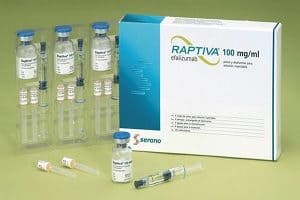
Raptiva Pulled from U.S. Market. Raptiva, an injectable drug used to treat moderate to severe plaque psoriasis, is being withdrawn from the U.S. market. According to Genentech, Raptiva has been associated with progressive multifocal leukoencephalopathy (PML), a serious and almost always fatal brain infection caused by a virus. Raptiva was approved by the U.S. Food […]

Raptiva Pulled from U.S. Market. Raptiva, an injectable drug used to treat moderate to severe plaque psoriasis, is being withdrawn from the U.S. market. According to Genentech, Raptiva has been associated with progressive multifocal leukoencephalopathy (PML), a serious and almost always fatal brain infection caused by a virus.
Raptiva was approved by the U.S. Food & Drug Administration (FDA) in 2003. Raptiva works by blocking the activation of certain immune cells called T cells, and the migration of those cells into the skin. However, by suppressing the body’s natural defense system, it can also increase the risk of serious infections and malignancies in patients.
In October 2008, U.S. regulators had already required Genentech to place a Boxed Warning on the Raptiva label regarding the drugs’ risk of PML and other infectious diseases. In February, the FDA warned that ‘Raptiva’ had been linked to three fatal cases of PML. The agency also said that it had learned of a suspected PML death in a fourth person treated with Raptiva.
That same month, European Medicines Agency said that in light of the deaths, Raptiva’s benefits no longer outweighed its risks, and recommended it be withdrawn from the market in Europe.
PML attacks the brain and central nervous system and is usually fatal. It is caused by a polyomavirus, called the JC virus, which is often acquired during childhood. Most adults have been infected with the JC virus but do not develop PML. Symptoms include vision problems, loss of coordination, and memory loss. Patients who survive the disease are often permanently disabled.
In a letter to health care providers, Genentech said there is no way to determine which Raptiva patients may be at risk for developing PML. There is also no cure or treatment for the disease. Because the risk/benefit profile for ‘Raptiva’ has changed, it will be subject to a voluntary, phased withdrawal, and will no longer be available to U.S. patients after June 8 2009, Genentech said.
Genentech’s letter advised that doctors should stop writing prescriptions for Raptiva for new patients. Prescribers should review the treatment of all patients who are currently receiving Raptiva, with a goal of stopping treatment in a prompt but appropriate manner, the letter said. The drug maker also advised that patients be closely monitored for signs of PML following discontinuation of Raptiva.
Genentech also sent a letter to ‘Raptiva’ patients informing them of the drug’s withdrawal. Other drugs that suppress the immune system have also been linked to PML.
Last September, Genentech revised a warning on Rituxan to reflect the case of a rheumatoid arthritis patient who was treated with the medicine and died from PML.
Last summer, the FDA warned that the same brain disease had been associated with Tysabri, a drug for multiple sclerosis. The FDA warning was prompted by reports that two European MS patients undergoing Tysabri monotherapy had developed PML.
In the U.S., Tysabri was taken off the market in 2005 after three patients in clinical trials developed PML. But the drug was reapproved in 2006, although it was subject to restrictions.
The personal injury attorneys at Parker Waichman LLP offer free, no-obligation case evaluations. For more information, fill out our online contact form or call 1-800-YOURLAWYER (1-800-968-7529).


